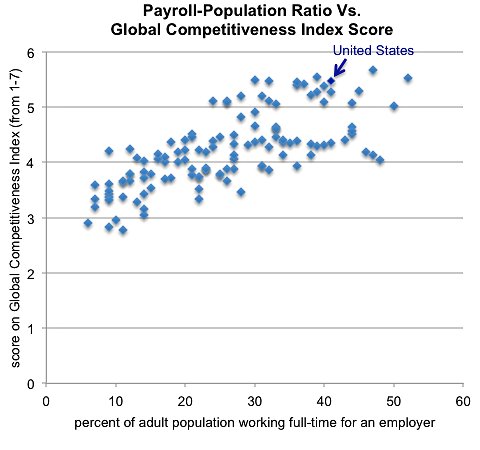
CATHERINE RAMPELL
Dollars to doughnuts.
For the fourth consecutive year, Switzerland is the most competitive economy in the world, according to a ranking from the World Economic Forum. And, for the fourth consecutive year, the United States fell in the rankings — largely because of worsening criticism of the American government — and is now in seventh place.
The interactive map below shows how each of the 144 countries analyzed ranked. Click on any country to see how it stacks up on different dimensions of competitiveness.
The World Economic Forum defines competitiveness as “the set of institutions, policies, and factors that determine the level of productivity of a country” and thereby lead to sustainable growth. The report graded economies based on an index of categories like over-regulation, property rights, tax burdens, transparency and trustworthiness of both the government and the financial sector, infrastructure, inflation conditions, the health and educational attainment of the population, access to technology, and research and development.
The main reasons the United States has been slipping in the rankings appear related to distrust of and lack of confidence in government leadership.
Here’s an excerpt from the report; the numbers in parentheses refer to America’s ranking on that category in relation to all 144 countries:
The business community continues to be critical toward public and private institutions (41st). In particular, its trust in politicians is not strong (54th), perhaps not surprising in light of recent political disputes that threaten to push the country back into recession through automatic spending cuts. Business leaders also remain concerned about the government’s ability to maintain arm’s-length relationships with the private sector (59th), and consider that the government spends its resources relatively wastefully (76th). A lack of macroeconomic stability continues to be the country’s greatest area of weakness (111th, down from 90th last year). On a more positive note, measures of financial market development continue to indicate a recovery, improving from 31st two years ago to 16th this year in that pillar, thanks to the rapid intervention that forced the deleveraging of the banking system from its toxic assets following the financial crisis.
Note also that the map shows a sharp divide in competitiveness between Southern Europe (Greece, Italy, Spain) and Northern and Central Europe (Finland, Sweden, Germany, etc.). This is a divide that has been growing,
Separately, Gallup on Wednesday released a new metric looking at the share of adults in each country who are working full time for an employer (as opposed to being unemployed, out of the labor force or self-employed). The United States came in 16th place, with 41 percent of its adult population working at least 30 hours a week for an employer. Worldwide, the share is 27 percent.
This metric is closely correlated with economic growth, as well as with a country’s competitiveness rating:
 Source: Gallup, World Economic Forum Global Competitiveness Report. Gallup results are based on telephone and face-to-face interviews with 187,119 adults, aged 15 and older, conducted in 2011 in 148 countries and areas. World Economic Forum data are from the 2012-13 rankings report.
Source: Gallup, World Economic Forum Global Competitiveness Report. Gallup results are based on telephone and face-to-face interviews with 187,119 adults, aged 15 and older, conducted in 2011 in 148 countries and areas. World Economic Forum data are from the 2012-13 rankings report.
Article source: http://economix.blogs.nytimes.com/2012/09/06/a-look-behind-the-u-s-decline-in-global-competitiveness/?partner=rss&emc=rss